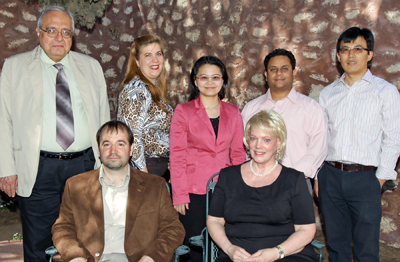By Laura L. Acosta
UTEP News Service
Nine UTEP faculty members went back to school this spring to get a JumpStart on their research.
As part of the “JumpStart Your Research” program launched by the University’s Office of Research and Sponsored Projects (ORSP) in spring 2011, the group of assistant and associate professors from liberal arts, engineering, nursing, education and science participated in a series of workshops for one semester that combined research and education to help them write successful grant proposals.
Since January, participants have met every other Tuesday for nearly two hours to learn about critical components of proposal planning and writing and to discuss their ideas and receive feedback from their peers and the Proposal Development Team (DevT). The participants received homework assignments that were critically reviewed by the DevT.

A special ceremony on April 21 recognized and celebrated the hard work of the program’s most recent graduates – Caroline Arruda, Ph.D., assistant professor of philosophy; Michael McGarry, Ph.D., assistant professor of electrical and computer engineering; Holly Mata, research assistant professor in the Hispanic Health Disparities Research Center; Kathleen O’Connor, assistant professor of nursing; Paras Mandal, assistant professor of industrial, manufacturing and systems engineering; Behzad Djafari-Rouhani, associate professor of mathematical sciences; XiuJun (James) Li, assistant professor of chemistry; and Graciela Perera, Ph.D., visiting assistant professor of computer science professor supported by the Computing Alliance of Hispanic-Serving Institutions.
Each faculty member had the opportunity to briefly discuss his or her research, which included cyber security, renewable energy, community engagement and mental health disparities.
“When you’re hired by a university, I think that the university has a commitment to help you succeed – that’s my philosophy, whatever it takes,” said Roberto Osegueda, Ph.D., vice president for research, during the ceremony at the Peter and Margaret de Wetter Center. “Research is getting more and more competitive; the skills you acquire in trying to present your personal research goals and trying to sell those goals are not that easy. It is important that the skills for writing proposals and seeking alternative funding be there.”
The occasion was also a time to congratulate McGarry, who found out earlier that day that the research proposal he had been working on, which incorporated some of the lessons that he learned from the JumpStart program, had been selected for funding. McGarry will study fiber-to-home networks in tandem with a copper access network, which he presented to Huawei, a Chinese telecom equipment manufacturer.
Out of six different proposals, this is the first of McGarry’s that has been funded. He credits JumpStart with showing him how to catch the funder’s attention by stating the project goals at the beginning of his proposal, then explaining the activities to achieve those goals.
“It’s actually just thinking about your research that way that really helps you to plan out what you’re looking to do, and I think it just makes it very clear to the funder,” McGarry said.
Another spring JumpStart participant, Paras Mandal, whose research focuses on technological challenges associated with power and energy systems, considered JumpStart an incentive from the University, which helps faculty gain extra knowledge. His last proposal was funded in January. However, JumpStart has enhanced his writing abilities and improved the flow of his proposals.
“This was very impressive and useful, and I recommend to any new faculty to go, because you are not losing anything – you are going to gain something,” Mandal said.
Andrea Tirres, coordinator for the spring 2012 JumpStart, said that the program provides a good foundation for participants who can inject some of the lessons from their homework assignments into their proposals. It also provides an opportunity to promote interdisciplinary research among the different faculty members.
The program is offered each spring and fall semester. To date, 59 faculty and staff members have graduated.
Martine C. Ceberio, Ph.D., assistant professor of computer science, graduated from the JumpStart program in fall 2011. Even though she has been at UTEP for 9 years, Ceberio saw the program as an opportunity to meet faculty from different disciplines who might be interested in collaborating with her on new ideas.
Ceberio recalled that on the first day of the fall JumpStart session, she met Lawrence Cohn, Ph.D., psychology professor and associate dean of the College of Liberal Arts, and Luciana Garbayo, Ph.D., assistant professor of philosophy. The three colleagues started to brainstorm and formed a decision-making and judgment group with initial funding from the Interdisciplinary Research Incentive Program sponsored by the UTEP Provost’s office.
“We’ve heard about interdisciplinary research and collaboration that was just floating around, but now it’s really come true,” Ceberio said. “Now you see that there is a real effort for that.”
JumpStart is organized by the ORSP’s DevT, under the direction of Ann Q. Gates, Ph.D., associate vice president for research, and team members Florence Dick, coordinator for pre-award services; Maria L. Picard-Ami, proposal development specialist; and Andrea Tirres, proposal development specialist. The DevT provides a full spectrum of services that includes assisting with developing, writing and editing proposals; identifying funding sources; proofing submissions; and organizing workshops.
In addition to JumpStart, DevT members also coordinate Workshops on Demand, which are tailored to a department or college’s needs, and Graduate Student Fellowship Workshops that instruct students how to submit a successful NSF Graduate Research Fellowship Application. Every other Monday and Thursday, the team hosts Brown Bag lunches, which provide faculty the opportunity to discuss diverse topics in an informal setting with guest speakers, share their research ideas, get feedback and discuss potential funding sources.
For more information on the JumpStart Your Research program, the Interdisciplinary Research Incentive Program, the brown bag events or Workshops on Demand, visit the ORSP website at research.utep.edu.
